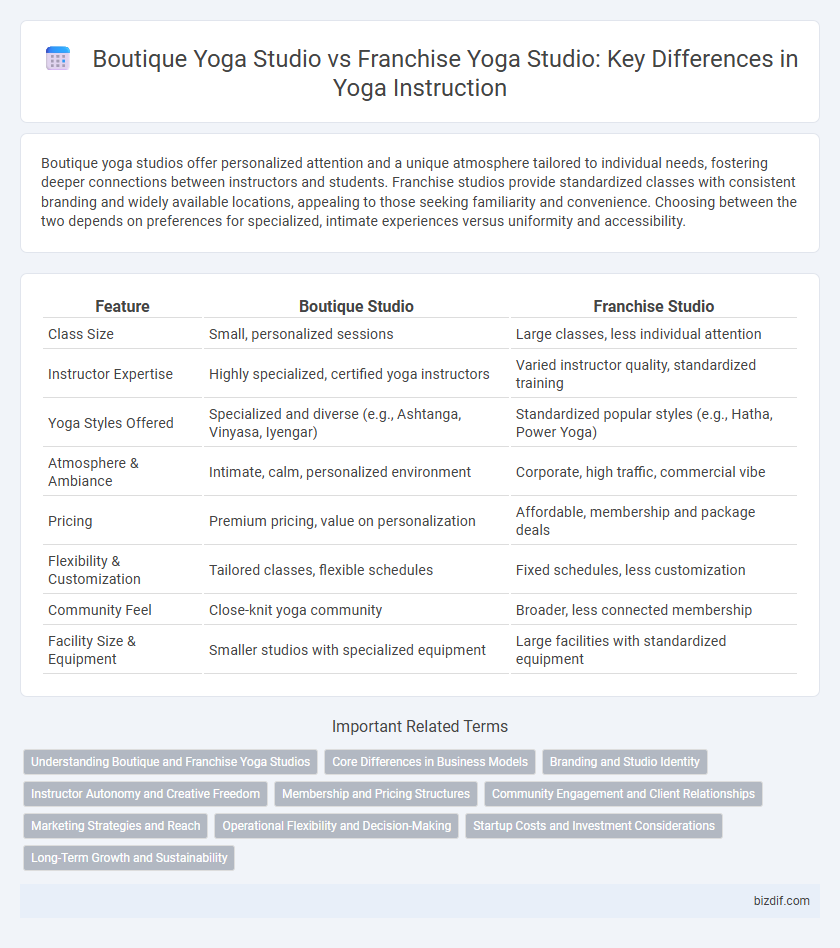Boutique yoga studios offer personalized attention and a unique atmosphere tailored to individual needs, fostering deeper connections between instructors and students. Franchise studios provide standardized classes with consistent branding and widely available locations, appealing to those seeking familiarity and convenience. Choosing between the two depends on preferences for specialized, intimate experiences versus uniformity and accessibility.
Table of Comparison
| Feature | Boutique Studio | Franchise Studio |
|---|---|---|
| Class Size | Small, personalized sessions | Large classes, less individual attention |
| Instructor Expertise | Highly specialized, certified yoga instructors | Varied instructor quality, standardized training |
| Yoga Styles Offered | Specialized and diverse (e.g., Ashtanga, Vinyasa, Iyengar) | Standardized popular styles (e.g., Hatha, Power Yoga) |
| Atmosphere & Ambiance | Intimate, calm, personalized environment | Corporate, high traffic, commercial vibe |
| Pricing | Premium pricing, value on personalization | Affordable, membership and package deals |
| Flexibility & Customization | Tailored classes, flexible schedules | Fixed schedules, less customization |
| Community Feel | Close-knit yoga community | Broader, less connected membership |
| Facility Size & Equipment | Smaller studios with specialized equipment | Large facilities with standardized equipment |
Understanding Boutique and Franchise Yoga Studios
Boutique yoga studios offer personalized instruction with a focus on unique class styles, intimate class sizes, and strong community connections, catering to clients seeking tailored wellness experiences. Franchise yoga studios provide standardized classes across multiple locations, emphasizing brand consistency, accessibility, and affordability to attract a broad customer base. Understanding these differences helps practitioners choose studios aligned with their preferences for customization versus uniformity in yoga practice.
Core Differences in Business Models
Boutique yoga studios emphasize personalized instruction, intimate class sizes, and niche market targeting, fostering a strong community atmosphere and tailored client experiences. Franchise studios operate on standardized business models with uniform branding, extensive class offerings, and scalable marketing strategies designed for rapid expansion and consistent service delivery. The core differences lie in the level of customization, operational control, and growth approach, where boutique studios prioritize quality and exclusivity while franchises focus on accessibility and brand unity.
Branding and Studio Identity
Boutique yoga studios emphasize a unique, personalized brand identity that reflects the instructor's philosophy and fosters a close-knit community, enhancing client loyalty through tailored experiences. Franchise studios prioritize consistent branding across locations to maintain broad market recognition but may sacrifice individual studio character and distinctiveness. This uniformity supports scalability but often limits creative expression and personalization integral to boutique studio appeal.
Instructor Autonomy and Creative Freedom
Boutique yoga studios offer instructors greater autonomy and creative freedom by allowing them to design personalized class themes and tailor sequences to their unique teaching style. Franchise studios often impose standardized curriculums and scheduling constraints, limiting instructors' ability to innovate or diversify class formats. Instructor empowerment in boutique studios fosters a more authentic connection with students, enhancing overall class experience and satisfaction.
Membership and Pricing Structures
Boutique yoga studios often offer flexible membership plans with personalized pricing tailored to individual needs, fostering a community-centric experience. Franchise studios typically provide standardized membership packages with tiered pricing designed for broader accessibility and consistency across locations. Members at boutique studios benefit from limited class sizes and exclusive workshops, while franchise memberships emphasize affordability and extensive class variety.
Community Engagement and Client Relationships
Boutique yoga studios cultivate deeper community engagement by offering personalized class experiences and fostering close-knit relationships between instructors and clients. Franchise studios often prioritize standardized programming and high client turnover, which can limit opportunities for individualized attention and meaningful connections. The intimate atmosphere of boutique studios encourages ongoing client loyalty and active participation in community events, enhancing overall satisfaction.
Marketing Strategies and Reach
Boutique yoga studios leverage personalized marketing strategies that emphasize community engagement, local collaborations, and targeted social media campaigns to build a loyal client base. In contrast, franchise studios benefit from large-scale advertising budgets, national brand recognition, and standardized marketing approaches that enable broader geographic reach. The boutique approach fosters deeper personal connections and niche market appeal, while franchises capitalize on consistent messaging and expansive market penetration.
Operational Flexibility and Decision-Making
Boutique yoga studios offer greater operational flexibility and faster decision-making due to their smaller size and independent ownership, enabling customized class schedules and personalized client experiences. Franchise studios operate under strict corporate guidelines, limiting adaptations to local market demands and delaying decisions through hierarchical approval processes. This often results in standardized offerings that may not fully address community-specific needs or preferences.
Startup Costs and Investment Considerations
Boutique yoga studios typically require lower startup costs, ranging from $30,000 to $100,000, due to smaller spaces and personalized equipment investments, while franchise studios often demand initial franchise fees of $50,000 to $250,000 plus ongoing royalties. Investment considerations for boutique studios emphasize flexible branding and unique class offerings, contrasting with franchise models that provide established marketing support and standardized operations but limit customization. Entrepreneurs must weigh upfront financial commitments against long-term scalability and brand control when choosing between boutique and franchise yoga studio options.
Long-Term Growth and Sustainability
Boutique yoga studios offer personalized experiences and foster strong community connections, driving long-term client loyalty and sustainable growth. Franchise studios benefit from standardized branding and broader market reach but may face challenges in maintaining consistent quality and authentic client relationships. Investing in a boutique model supports adaptability and deeper engagement, essential for enduring success in the evolving wellness industry.
Boutique Studio vs Franchise Studio Infographic

 bizdif.com
bizdif.com